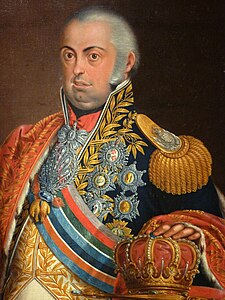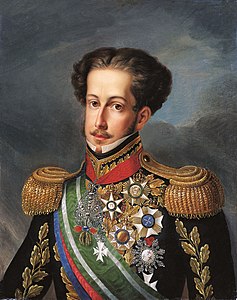Inquiries for Swiss troops in Brazilian service

|

|
|
|
Flag of Brazil 1819 (Kingdom)
|
Flag of Brazil 1840 (Empire)
|
The requests from the King in 1819 and from the Emperor of Brazil in 1840 for Swiss troops in Brazilian service were unsuccessful. There were no Swiss troops in Brazilian service.
Swiss troops in foreign service was the name of the paid service of commanded, whole troop bodies abroad, regulated by the authorities of the Swiss Confederation by international treaties .
These treaties contained a chapter regulating military affairs: the so-called surrender (or private surrender if one of the contracting parties was a private military contractor).
Johann VI. , King of Brazil
1816–1822Peter I , Emperor of Brazil
1822–1831Peter II , Emperor of Brazil
1831–1889
1815, fateful year on both sides of the Atlantic
The fall of Napoleon Bonaparte in 1815 and the lifting of his continental blockade had lasting effects on both sides of the Atlantic.
The Congress of Vienna rose in 1815 the Portuguese colony of Brazil, where the royal family of Braganza in 1807 before fled Napoleon was part of the overall State United Kingdom of Portugal, Brazil and the Algarves to the rank of a kingdom. Rio de Janeiro , the seat of government and, in fact, the capital of the Portuguese empire, became the center of the flourishing Brazilian foreign trade (especially sugar and coffee, later also rubber). The simultaneous decline of the Brazilian slave economy promoted the need for skilled workers for agriculture and industry.
In Switzerland, exhausted by the Napoleonic wars, the lifting of the continental block in 1815, which led to the importation of cheap (mainly English) products, and the sharp increase in import duties on its main market, France, triggered a drastic economic downturn in the domestic economy.

In the same year, the Tambora volcano on the island of Sumbawa (Indonesia) hurled huge amounts of ash into the atmosphere, which also made 1816 the “ year without a summer ” in Switzerland . The economic crisis has now been exacerbated by a food crisis.
Continuous rain and cold destroyed the harvests, created a shortage of food, led to a sharp rise in prices and famine. The industrial locations in the Central Plateau were particularly hard hit. For example, St. Gallen recorded 5,000 starvation deaths in 1817!
The measures taken by the federal authorities, redistributing the common land or developing the floodplains into production areas, seemed rather helpless. Emigration, long the emergency valve of the country, which has always been overpopulated in view of the scarce resources, swelled, especially as usual, that to North America (Ohio).
The colony of Nova Friburgo
The canton of Friborg was able to avoid the greatest disaster by buying food. In 1817, however, the Freiburg government sent Sebastien Nicolas Gachet, a colorful personality, to Rio de Janeiro to found a Swiss colony in Brazil. King John VI finally let himself be convinced by the envoy from Freiburg and signed a settlement agreement in 1818 to finance a colony of 100 Catholic Swiss families in the Cantagalo district, 130 km northeast of the city of Rio de Janeiro. The " Nova Friburgo " colony received its town charter as early as 1820 and by then, along with immigrants from other countries, had already accepted Swiss emigrants in 2006 (from Friborg (830), Bern (500), Wallis (160), Aargau (143), Lucerne (140) and 5 other cantons). Nova Friburgo is now a modern city with over 180,000 inhabitants.
The first advertising request in 1819
The bustling Sebastien Gachet, inspired by his successful settlement mission and meanwhile Swiss consul in Rio de Janeiro, was apparently able to convince the Portuguese king in Brazil not only of the agricultural and industrial prowess of the Swiss, but also of their military skills. He could use them well in the clashes with Spain on Brazil's western and southern borders because of the Bandeirantes .
So got Gachet in 1819 on behalf of Johann VI. with an application for Swiss troops in Brazilian service to the federal estates to the mayor and council of the city and republic of Lucerne.
He even included a proposal for a detailed military surrender with 80 paragraphs with the application for a " Corps Schweizer ".
The still war-weary Confederates felt no desire for the South American adventure. The advertisement was unsuccessful.
The second advertisement in 1840
After the return of John VI. After Portugal, his son, who was appointed regent in Rio de Janeiro, had renounced the Kingdom of Brazil from Portugal in 1822 and had himself crowned emperor as Peter I. In 1831, however, a military coup forced him to abdicate in favor of his five-year-old son. Until his early declaration of majority in 1840 and his coronation as Peter II , he was represented by a Regency Council appointed by the Brazilian parliament. When he took office, Peter II was confronted with the secession of the province of Rio Grande do Sul ( Republic of Piratini ) and other uprisings. He needed troops.
In 1840, the Pisa-born colonel in the Brazilian service, Luigi dell Hoste, on behalf of Peter II submitted a request for advertising to the federal suburb of Zurich for a " Corps of Swiss " consisting of two regiments totaling 2,600 men. The duration of the obligation should be 5 years from arrival in Brazil, but the wages (according to the approach for the Brazilian military) should be paid out from the moment the advertising contract is signed. In addition, after 5 years of service, the recruited person was entitled to a piece of land of around 9,000 square meters (equivalent to a good 800 square meters, i.e. a small field!).
Zurich sent the application in a detailed circular to the " esteemed gentlemen, loyal, dear Confederates " of the other estates, clearly indicating its negative attitude. The letter recommended that the cantons interested in a troop position establish direct contact with the Brazilian representative in Switzerland and ended with a greeting that was almost carefully chosen compared to today's smileys:
" Incidentally, we guarantee the same of our excellent respect and trustingly recommend each other in the protection of the Almighty ."
The Confederates obviously did not want to rely on them in this matter. At this time, some cantons were already banning advertising for third-party services. The offer was also too modest financially. This Brazilian advertisement also had no chance.
So there were no Swiss troops in Brazilian service.
Emperor Peter II became one of the most capable regents of his time. Under his regime, Brazil developed enormously economically and culturally. However, like his father, he was overthrown in a military coup in 1889 and had to leave the country with his family. Since then, Brazil has remained an independent republic, interrupted by two decades of military dictatorship. The first free democratic elections after that took place in 1985.
bibliography
- Friedrich E. Friedli: Swiss emigration to the state of Rio de Janeiro, Swiss in the Nova Friburgo region (Brazil) , publication of the Association "Le Tireur Fribourgeois" Santa Maria Madalena, Friborg 2010.
- Marlon Ronald Fluck: Basel Missionaries in Brazil: Emigration, Revival and Church Development in the 19th Century , Lang Verlag, Bern 2004, OCLC 1039752758 .
- Béatrice Ziegler: Swiss instead of slaves: Swiss emigrants in the coffee plantations of São Paulo (1852-1866) , Steiner Verlag, Wiesbaden 1985, OCLC 1091963882 .
- Martin Nicoulin: La genèse de Nova Friburgo. Emigration et colonization suisse au Brésil 1817–1827 . Friborg 1973, OCLC 163969925 .
- Felix Moeschlin: Large settlement in Brazil ?: a colony plan Switzerland-Paraná , Montana Verlag, 1936, OCLC 906823377 .
See also
Web links
- Friborg-Nova Friburgo Society (German / French)
- Society of "the Freiburg shooters" Maria Madalena (German / French)
- FDFA: bilateral relations between Switzerland and Brazil (German)
Individual evidence
- ↑ Thomas Fischer: Brazil. In: Historical Lexicon of Switzerland .
- ^ Anne-Lise Head-König: Emigration. In: Historical Lexicon of Switzerland .
- ↑ Thomas Henkel: Gachet, Sébastien Nicolas. In: Historical Lexicon of Switzerland .
- ^ Friedrich E. Friedli: Swiss emigration to the state of Rio de Janeiro, Swiss in the Nova Friburgo region (Brazil) , publication by the Association "Le Tireur Fribourgeois" Santa Maria Madalena, Friborg 2010.
- ↑ Lucerne's emigration to Nova Friburgo in Brazil in 1819 In: Schaufenstergeschichten, Staatsarchiv Luzern, accessed July 21, 2016.
- ↑ a b Lucerne State Archives ACT 23/9 C: Brazil. \ About the establishment of a Swiss corps in 1819.1840 .
- ↑ Editing: Münchner Tagpost, third year, first half of the year, miscellaneous , page 466, printed by Johann Deschler in the suburb of Au, Munich 1840.
- ↑ Peter Ehrenzeller: St. Gallische Jahrbücher 1835-1841, Foreign guests 1840 , page 355, Verlag Scheitlin and Zollikofer, St. Gallen 1842.




